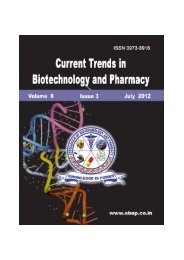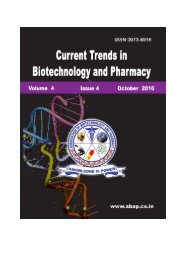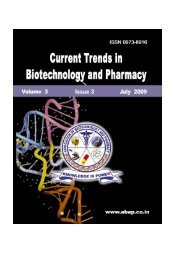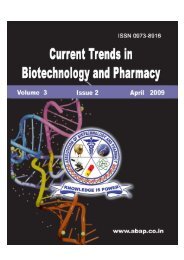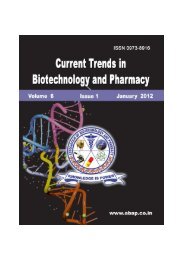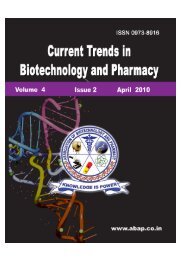d(GC) - Association of Biotechnology and Pharmacy
d(GC) - Association of Biotechnology and Pharmacy
d(GC) - Association of Biotechnology and Pharmacy
Create successful ePaper yourself
Turn your PDF publications into a flip-book with our unique Google optimized e-Paper software.
Current Trends in <strong>Biotechnology</strong> <strong>and</strong> <strong>Pharmacy</strong><br />
Vol. 6 (2) 166-172 April 2012, ISSN 0973-8916 (Print), 2230-7303 (Online)<br />
Delivery Strategies to Improve In Vivo Stability <strong>of</strong><br />
Immunogenic Peptide PADRE<br />
Srinivas Poondru 1,2 , Vivek Purohit 1 , Poonam Saraf 1 <strong>and</strong> Bhaskara Jasti 1*<br />
1 Thomas J. Long School <strong>of</strong> <strong>Pharmacy</strong> & Health Sciences, University <strong>of</strong> the Paciûc, 3601 Paciûc Avenue,<br />
Stockton, CA 95211, United States<br />
2 Current address: OSI Pharmaceuticals, Inc., Deerfield, IL, USA<br />
* For Correspondence - bjasti@pacific.edu<br />
Abstract<br />
PADRE, a peptide with potential in breast<br />
cancer immunotherapy exhibits low in vivo<br />
efficacy due to poor tumor uptake <strong>and</strong> significant<br />
enzymatic degradation. In the present work, novel<br />
delivery based approaches were utilized to<br />
improving the efficacy <strong>of</strong> PADRE. The utility <strong>of</strong><br />
these approaches in the delivery <strong>of</strong> PADRE was<br />
tested on in vitro cell based models. In the in<br />
vitro systems, PADRE was not internalized in<br />
Caco-2 cells to a significant extent as observed<br />
from the concentrations in cell pellet, which were<br />
always lower than 5%. Also, 90% <strong>of</strong> PADRE<br />
externally associated with the Caco-2 cells was<br />
degradated within 4 hours, possibly due to the<br />
breakdown by ecto-peptidases associated with<br />
tumor cells. Enzyme inhibitors, antitrypsin<br />
reduced the PADRE degradation in Caco-2 cells<br />
(20%) as compared to untreated cells (55%). The<br />
lipoprotein based systems were formulated using<br />
with <strong>and</strong> without 0.1% sodium lauryl sulfate that<br />
yielded 45 <strong>and</strong> 53% loading <strong>of</strong> PADRE,<br />
respectively. The efficacy <strong>of</strong> PADRE lipoproteinbased<br />
systems was determined by performing<br />
CD4 proliferation assay. The lipoprotein based<br />
systems with 20 µg/mL treatment with <strong>and</strong><br />
without 0.1% sodium lauryl sulfate showed 3.2<br />
<strong>and</strong> 2.8 times CD4 proliferation observed as<br />
compared to control. The CD4 proliferation on<br />
treatment with native PADRE was 4.3 times<br />
compared to a no treatment control, however this<br />
was not statistically significant (p>0.05) when<br />
Delivery Strategies to improve PADRE<br />
166<br />
compared to the PADRE activity from lipoprotein<br />
systems indicating that thelipoprotein-based<br />
approach was suitable delivering PADRE as it<br />
retained the immunogenic activity. The strategies<br />
studied to deliver PADRE were successful in vitro<br />
<strong>and</strong> showed potential for improving its<br />
immunogenic efficacy in vivo by improving its<br />
stability.<br />
Keywords: PADRE delivery, peptidase inhibitors,<br />
lipoprotein delivery system<br />
Introduction<br />
Breast cancer is the most common cancer<br />
detected amongst women worldwide <strong>and</strong> also the<br />
second most leading cause <strong>of</strong> cancer related<br />
deaths amongst women in the world. According<br />
to statistics released by the National Cancer<br />
Institute, there were 2,30,480 cases <strong>of</strong> breast<br />
cancer in females in the United States alone<br />
reported in the year 2011 <strong>and</strong> an estimated<br />
39,520 deaths. Breast cancer treatment involves<br />
radiation <strong>and</strong> surgery to locally treat <strong>and</strong> remove<br />
the primary tumor followed by adjuvant therapy<br />
to combat the metastasized tumor cells. Adjuvant<br />
therapy includes treatment with<br />
chemotherapeutic drugs, hormonal therapy <strong>and</strong><br />
immunotherapy. Chemotherapy is effective but<br />
non-specific <strong>and</strong> therefore suffers from several<br />
adverse effects. Immunotherapy is gaining<br />
importance due to the selective recognition <strong>and</strong><br />
destruction <strong>of</strong> cancer cells, thereby sparing the<br />
normal cells <strong>and</strong> minimizing the adverse effects.



